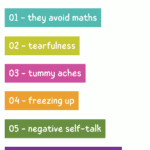If your child gets upset at the sight of a maths worksheet or manages to divert your attention when you ask them a simple times table, they might not just be “bad at maths”—they might be experiencing maths anxiety.
Maths anxiety is a very real, prevalent issue and unpleasant – and not just among children.
In this post, we’ll explore maths anxiety and answer some common questions that will help you support your child.
Affiliate Disclosure: This post may contain affiliate links. This means that I may receive a small commision – at no cost to you – if you make a purchase through these links. Thank you for your support!
What is Maths Anxiety?
Maths anxiety is a feeling of tension, fear or helplessness that interferes with a child’s ability or willingness to participate in maths tasks. It can present itself as tearfulness, avoidance strategies, sudden tummy aches or nausea, or their minds going blank during maths lessons and activities.
It’s not about laziness or low intelligence. Many children with maths anxiety are bright and capable but become so overwhelmed by worry that they can’t access what they know.
Left unchecked, maths stress in children can have a negative impact on daily life and life opportunities.
My Own Maths Fear
I feared maths as a child. I have vivid memories of being around seven years old, regularly pretending to have a stomach ache just to avoid times tables tests. Maths always felt like a mystery that I just couldn’t crack—no matter how hard I tried. It didn’t help that I didn’t understand why it felt so much harder for me than for everyone else.
It wasn’t until I trained to become a teacher that things finally started to click. That was also when I was diagnosed with dyslexia, and suddenly, so much of my school experience made sense. Before that, I just thought I wasn’t very clever.
Truthfully, I don’t even remember most of my secondary school maths lessons—so I must have blocked them out completely. That’s how strong the stress was.
Now, as a tutor, I see so many children experiencing similar feelings. That’s why I’m passionate about teaching maths in a way that’s calm, hands-on and confidence-building—because I know what it feels like to sit there and believe you can’t do it.
Who is affected by it?
Anyone can be affected by maths anxiety – children and adults, all genders and all backgrounds can experience it. Most people will experience some degree of it at some point in their lives.
There is some research that suggests that females experience maths anxiety more frequently than males. This could be partly due to girls feeling anxious about their own ability because of the common misconception that boys are naturally more able mathematicians.
How Does It Affect Learning?
When a child feels anxious, it affects their mind, body and behaviour. Anxiety triggers the body’s stress response which causes increased heart rate and breathing rate – otherwise known as ‘fight or flight’. This makes it harder to process information, hold things in working memory, or solve problems step-by-step.
Responses to anxiety often appear to be out of proportion to the situation, but these intense feelings of fear or panic are incredibly difficult for children to control.
Over time, maths anxiety can lead to:
- Low confidence and self-esteem
- Difficulties with concentration
- Avoidance of maths at home or in school and potentially school refusal
- Falling behind, even if the child once loved maths
- Negative beliefs – like “I’m just not a maths person”
What Causes It?
Every child is different, and maths anxiety is a complex issue that can have several contributing factors, but some common causes include:
- Negative previous experiences
- Feeling rushed or timed during tasks
- Fear of being judged, made to feel wrong or compared to others
- Gaps in understanding that were never filled in
- Neurodivergent processing styles being overlooked
- A pressure to get everything “right” instead of focusing on growth
- A mismatch in teaching and learning style compatibility
- Parents’ own maths anxiety or attitude towards maths
- Pressure to meet parental expectations
What Can You Do as a Parent?
The good news is that maths fear doesn’t have to be permanent—and you can make a huge impact at home. Here’s how to help a child with maths anxiety:
- Validate feelings: It’s okay to feel stuck or scared.
- Focus on effort, not just answers: Praise trying, exploring and sticking with it.
- Slow things right down: Rushing causes panic. Go at your child’s pace.
- Use hands-on and multisensory methods: These can reduce anxiety by making learning feel more like play.
- Make maths part of everyday life: Learning opportunities are everywhere: shopping, cooking, sorting out toys. Maths doesn’t have to be a ‘lesson’.
- Fill in the gaps gently: A strong foundation rebuilds confidence.
- Little and often: Tiny bites of regular practice are better than a long tiring slog.
Maths doesn’t need to feel scary. With the right support, your child can shift from “I can’t do this” to “I’m getting there.”
I'd love to hear from you!
Have you or your child experienced maths anxiety? What strategies have you found helpful in managing it? Share your experiences and tips in the comments—I’d love to know what’s worked for you, and your story could help another parent too.
Maths anxiety is all too real for ‘sum’, new research finds – KPMG
A third of adults are nervous about numbers – National Numeracy













0 Comments